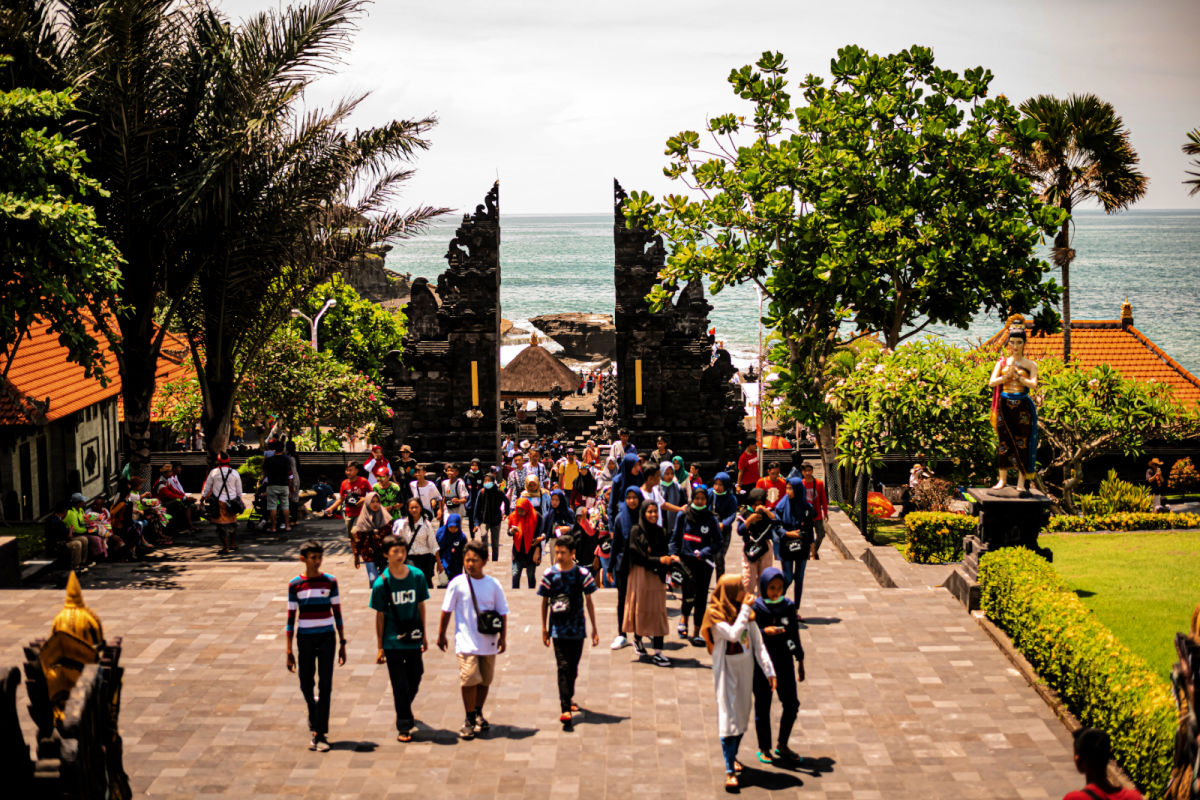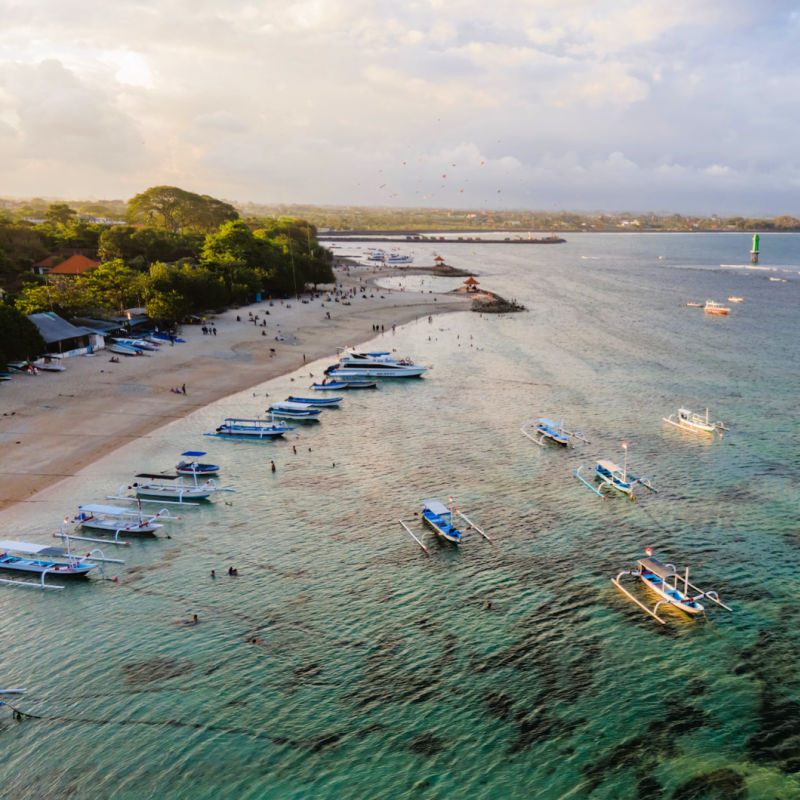Bali’s inclusion on a No List for travel in 2025 is causing quite a stir, just as the island is on track to see its busiest year for tourism on record.
Leaders are reflecting on how to balance high-quality experiences and sustainable growth as the destination is starting to see the negative impacts of overtourism and overdevelopment in the island’s most famous resorts.

Last week, Bali came out tops on Fodor’s No List for 2025.
Citing overtourism, poor control over waste management, and struggling infrastructure, Fodor called in travel experts, tourism academics, and local NGO leaders to discuss why travel in Bali in 2025 needs to change.
While neither Fodor nor the interviewees in the article called for a boycott of travel in Bali in 2025, it was clear that stakeholders want and need to see rapid and meaningful change. In truth, tourists do too.
Indonesia’s Deputy Tourism Minister, Bali-born Ni Luh Enik Ermawati, known as Ni Luh Puspa, told reporters, “What is currently happening on the island of Bali is not over-tourism, but rather the uneven distribution of tourists because they are concentrated in the southern part of Bali.”
“Meanwhile, the northern and western parts of Bali have many tourism potentials that are still unknown to tourists.”
She noted that the Ministry of Tourism is actively working to help redistribute tourism more evenly throughout Bali Province for the benefit of tourists and local communities.
Citing the new 3B Tour, which connects North Bali, West Bali, and Banyuwangi in East Java, Ni Luh Puspa said that there are plenty of incurable destinations in Bali Province just waiting to be discovered.
Ni Luh Puspa calls for tourists to explore a wider range of destinations in Bali with a focus on nature, culture, and, specifically, tourism villages.
She explained that “there is Tembok Tourism Village, Les Tourism Village, Lovina, and Pemuteran in North Bali. In Jembrana, there is the West Bali National Park, which is an attraction for the Bali Starling bird.”
“In Banyuwangi, there are many destinations such as Kemiren Tourism Village, G-Land, and Alas Purwo, and no less interesting is the Ijen Crater.”
The Head of the Bali Provincial Tourism Office, Tjokorda Bagyus Pemayun, spoke to reporters about the Fodor article and said that the moratorium on tourism development in South Bali is still on the cards.
The ban on the development of new tourist accommodations, restaurants, cafes, and entertainment venues in Badung Regency, Denpasar City, Tabanan Regency, and Gianyar Regency was due to come into effect in October, though the policy has been delayed.

Pemayun told reporters, “Yes, it is true, but we are still discussing it…I also asked about it during the coordination meeting in Jakarta.”
He added that the surge in tourist interest in a post-pandemic world was hard to predict, avoid, and control.
He noted, “After the pandemic, Bali was indeed flooded with tourists; it was indeed that long, two and a half years of longing for Bali to be visited. But in terms of the number of visits, it is still not like before the pandemic, which was 6.2 million [international arrivals].” Bali is on track to surpass 7 million international arrivals by the end of 2025.

Pemayun suggested that he and his teams work to control the number of permits that are being issued for tourism development projects even before the moratorium comes into effect.
He explained, “We still issue permits within the corridor according to OSS requirements, but we really monitor and verify according to regulations. If it is not appropriate, we will postpone it until this moratorium can be implemented.”
Tourists looking for a classic resort-style vacation in Bali in 2025 will find that destinations like Seminyak, Uluwatu, Canggu, Nusa Dua, and Sanur still tick all of the boxes.
For those looking for an authentic travel experience, away from the major resorts will still find plenty to discover in Bali.

Destinations like Sidemen, Muduk, Medewi, Amed, Lovina, Nusa Lembongan, and West Bali National Park have so much to offer and are free from crowds, traffic jams, and big tourism infrastructure that many tourists are seeking to avoid in 2025.
Remove All Ads & Unlock All Articles… Sign up for The Bali Sun Premium

Plan Your Bali Holiday:
Book The Best English Speaking Drivers For Airport Transfers & Tours
Choose From Thousands of Bali Hotels, Resorts, and Hostels with Free Cancellation On Most Properties
Book Cheap Flights To Bali
Don’t Forget Travel Insurance That Covers Medical Expenses In Bali
For the latest Bali News & Debate Join our Facebook Community
SUBSCRIBE TO NEW POSTS
Enter your email address to subscribe to The Bali Sun’s latest breaking news, straight to your inbox.
Discover more from The Bali Sun
Subscribe to get the latest posts sent to your email.

LightsabarLuke
Wednesday 27th of November 2024
7 million tourists in 2025? Are they not aware that the current water supply issue cannot sustain the amount of people on the island in 2024? There's gonna be a mass exodus in under 12 months and Bali will be on more than just Fodor's list.
Wayan Mataram
Tuesday 26th of November 2024
...Hopefully in the future Bali will not be abandoned by visitors/tourists due to environmental damage, waste problems, over tourism by non quality tourism, inadequate infrastructure. Uncontrollable development If this happens in a case similar to the Covid era, people will not be able to expect much from tourism, food self-sufficiency is one amongst the answers
James
Tuesday 26th of November 2024
All that fantasies about the north and west. Some tourist go there for a day-trip. That's it. Come on people. It's almost 2025. Travel influencers go to the most remote places in the world, you guys think if the north and west were worth travelling towards, it would not be common knowledge by now? Tourist come for the south. Beaches and good restaurants. And sure, some of them take a few trips. But that's it. There is no way the north and west of Bali will be chosen over other destinations in Asia - even Indonesia itself! Lombok is on the rise. It's quite, it's cleaner, and the central geovernment is in charge and actually taking problems serious, instead of a corrupt mixture of banjars and ministers.
What did Bali do to adress the gigantic trash problem? Blame it on tourists. Next year, when they really would implement the ban for hotels and restaurants to use official landfills, the problem will only get worse. Because now, the trash you see on the streets and in the oceans is coming from locals, not hotels who are willing to pay for pick up. And immagine next year, when they are forced to use corrupt pick up trucks who just dump it illegally somewhere... Already NGO's are putting pick ups on hold because of the landfill-ban for outsiders. It is a clusterf### in the making and Bali has been warned about this for years. Being nr 1 on the list of places to not go to, is their so beloved Karma working it's magic.
Solo57
Monday 25th of November 2024
Despite Bali's challenges with waste management, traffic, water issues , or possible over tourism, its one destination that I not only love & respect, but it's a destination I'll always return to . I'm doing ongoing humanitarian projects there, & usually make 2 -3 trips a yr . I just love the incredible people, food, hospitality, scenery etc . Anything that I can do to help improve the lives of the Balinese is one thing that I personally get a lot of satisfaction from . Bali will always have challenges, but it will always find a way to overcome issues without affecting locals or tourists too much. The changes that are underway now will benefit the island long term
BaliEyeWitness...
Wednesday 27th of November 2024
@Solo57, I totally respect your humanitarian work however, in my opinion, the changes which are underway in Bali right now are going to destroy the island in the medium to long-term. I refer to the total lack of any cohesive policy to deal with trash management, the dreadful air pollution and traffic jams on the roads and the appalling state of the roads themslves which are simply not safe. The natural environment, and the ricefields and Subak system, which underpins the culture of Bali for centuries is under threat so many ricefields have been lost in the last five years concreted over never to return .A challenge is there's not enough water now climate change happening, tourists consuming vastly more water than locals. And any attempt at regulation is completely destroyed by the appalling level of corruption which is endemic across Indonesia and especially in Bali. As Somebody who spends a lot of time there I'm amazed you haven't seen that this also destroys traditional values. The final straw breaking the camel's back is the vast amount of money coming in from Russia and China for investment is building mega resorts and beach clubs, and the money generally goes to foreign investors, not to local people who are paid a trivial wage for menial jobs.